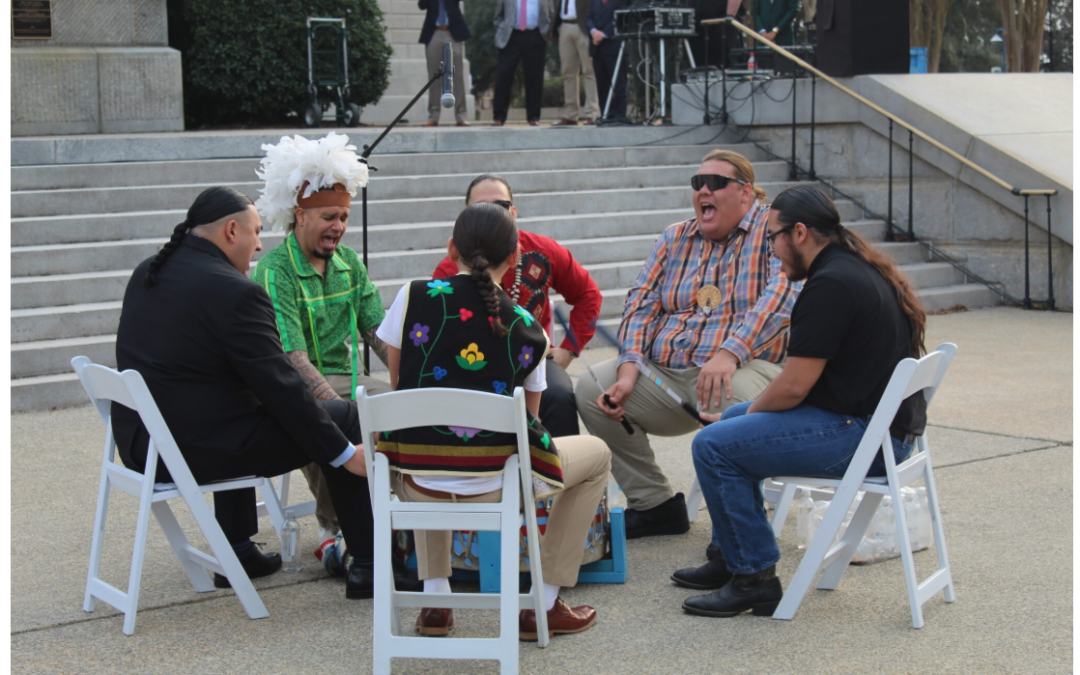SOUTH CAROLINA: SC Native American tribes sign treaty promising to work together
The treaty was likely the first of its kind in the country, tribal leaders said
COLUMBIA — South Carolina’s Native American tribes will pool their resources and advocate as a group for protections under a treaty signed Wednesday, prompted by fears of erasure as the state’s population grows.

The state’s 10 tribes — just one of them federally recognized — have long had friendly relationships. But the treaty marks a formal commitment to helping one another. This is the first time in South Carolina, and thought to be the first nationally, that 0tribes have made such an in-state commitment, tribal leaders said.
“Today marks a historic and sacred moment for all of us gathered here, as we unite in strength, purpose and pride, reaffirming our deep-rooted connections to this land and to each other,” said Lisa Collins, chief of the Wassamasaw Tribe of Varnertown Indians, located in Berkeley County between Moncks Corner and Summerville.
Tribal chiefs have been meeting regularly since the 1980s to discuss what’s happening in their parts of the state, said Joshua Shumak, Native American coordinator for the state Commission on Minority Affairs and a vice chief of the Wassamasaw Tribe.
As the state’s population grows, bringing with it increased housing and business development, most of the state’s chiefs decided to formally band together to protect their land from encroachment, they said during Wednesday’s signing ceremony on the Statehouse steps, to the cheers of about 200 people.
“Today, we stand at a crossroads, where the voices of our ancestors whisper in the wind, urging us to come together for the future of our people,” said Catawba Nation Chief Brian Harris.
The state has about 80,000 Native Americans, Harris said, many of whom the treaty will represent. One state-recognized tribe, the Pee Dee Indian Nation of Upper South Carolina, did not attend.
The Catawba Nation is the only federally recognized tribe, with a reservation of about 700 acres along the Catawba River in York County. But smaller tribes without designated land might face more pressure from incoming development pushing their culture out of the areas in which they live, tribal chiefs said.
Putting the weight of larger tribes, such as the 3,000-member Catawba Nation, behind those smaller nations could help bolster them through difficult times, chiefs said.
“Because there are tribes at varying levels of capacity, we understand that working together will help each community to thrive,” said Cheryl Cail, acting chief of Waccamaw Indian People. “We recognize that the ability to implement change in both federal and state policy requires unification of voice.”
State recognition is a way of granting governing authority to tribes who are unable to present the rigorous documentation required for federal funding and benefits, or who decide not to seek that recognition for another reason. The state began granting recognition in 2005, first to the Waccamaw Indian People.
At least 14 other states recognize tribes as having self-governing authority without federal recognition, according to the national Advisory Council on Historic Preservation.
Each of those tribes has its own language, culture and traditions, which could become lost to history without tribal leaders protecting their heritage, Cail said.

“By working collectively, we will be able to better protect our sacred sites, the environment and our people,” Cail said.
That history is longer than any other group in the state’s storied past, Gov. Henry McMaster said.
That’s important to remember when looking back on the story often taught of explorers reaching the Americas, he said.
“Well, America was already here,” McMaster said. “America was already peopled by the ancestors of these people that you see here right now.”
Meanwhile, the Catawba Nation’s reservation is expected to soon grow by about 13 acres — something York County Council has already approved.
Any expansion of the reservation must also be approved by the Legislature. The House unanimously agreed Tuesday. The legislation should also easily clear the Senate.
The expansion is part of the Catawba Nation’s recent push for more economic development and housing, said tribe spokeswoman Tylee Anderson.
–scdailygazette.com



